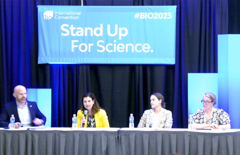Agriculture & Environment
Showing 1 - 20 of 20

Play
Jun 15, 2023
BioPharma & Bio Manufacturing: Changing the Narrative and Addressing Climate Challenges
Jun 15, 2023
Leveraging biotechnology innovation is key to combating climate change and advancing adaptation, mitigation, and resilience. Industry leaders discuss holistic emissions reduction efforts and how biopharmaceutical and biomanufacturing companies are tackling critical environmental challenges.

Play
Nov 23, 2022
Solutions to Plastic Pollution
Nov 23, 2022
Plastic is polluting our waterways and oceans, but biotechnology may deliver solutions. Plant-based bioplastics that can break down in months are one solution.
